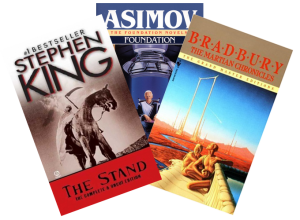 When I first started writing, I never intentionally tried to mirror a favorite writer. The problem was that I hadn’t found my own voice yet. So when I started creating stories, it surprised me when I discovered the stories were not my own.
When I first started writing, I never intentionally tried to mirror a favorite writer. The problem was that I hadn’t found my own voice yet. So when I started creating stories, it surprised me when I discovered the stories were not my own.
One of my early attempts was to write a science fiction epic that would have a galactic scale to it. I stopped after a few thousand words when I realized I was retelling Issac Asimov’s Foundation series. As time went on, I discovered an interest in writing stories about a populated Mars, not unlike Ray Bradbury. When I graduated college, it was Stephen King and his epic The Stand that I was mimicking in style — if not in apocalyptic subject matter.
Through all these phases in my writing, I was equally concerned and confounded by the advice I received to “find your own voice.”
I don’t have a voice, I wanted to argue. I only know how to write like the books I have read.
After a decade or so of writing, I’ve discovered my voice has been with me all along. It was my own voice I was drowning out by listening to my favorite authors whispering in my ear.
What I didn’t understand, what many new writers fail to grasp, is that our favorite writers aren’t doing anything special in their writing. They aren’t adopting a “writer’s voice” when they put pen to page. Do you want to know their secret? Lean in close and I’ll whisper it to you: They talk to you.
Writing can still be difficult. I get off track, I overwrite scenes, and I have a habit of putting on my editor hat when I should be writing. But when I get things right, it’s because I have stopped trying to write. Instead, I talk and let my fingers transcribe what I’m saying in my head.
That’s the voice I needed to find, and it was inside me all along.
